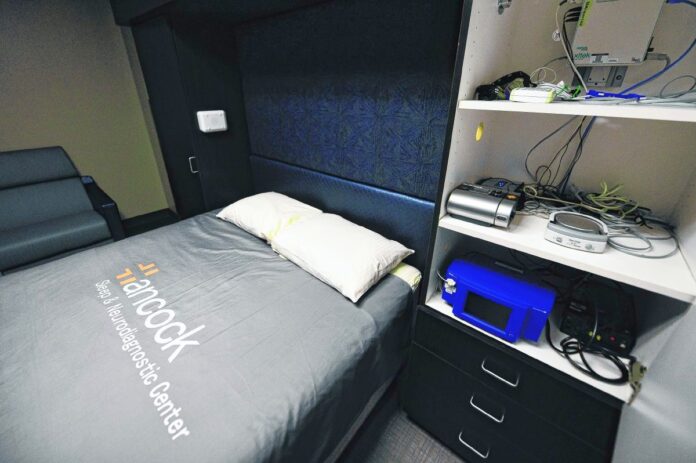
GREENFIELD — By spreading the word about how dangerous sleep apnea can be, Randy Campbell hopes people will realize it’s a condition that needs to be treated and not ignored. It can cause heart damage and even death, he said.
“A lot of times when they say someone has passed away in their sleep, it was probably sleep apnea,” said Campbell, who oversees the sleep center at Hancock Sleep Center at Hancock Regional Hospital.
At the center, he hands potential patients an illustration of a man called “Mr. Scary” which outlines how sleep apnea can affect every part of the body.
“When a person is sleeping, they start having a respiratory event, which means the airway is partially or completely blocked,” Campbell said. That causes a person’s oxygen saturation levels to drop, which prompts the heart to speed up to pump more oxygen.
“Your oxygen saturation should be above 90%, but we’ve had patients go all the way to 20 or 30,” Campbell said. The constant struggle throughout the night wears on the body and can leave a person feeling fatigued the next day.
“All night long your heart rate is speeding up and slowing down and your oxygen saturation is going up and down, so the morning when this person gets up, they’ve run a marathon. They’re exhausted,” he said.
The constant struggle throughout the night leads to high blood pressure, which sometimes can’t be controlled by medication, Campbell said.
Sleep apnea can also lead to disruptive sleep behaviors like flailing in bed or kicking your legs. “With some people, it’s like you’re riding a bicycle when you sleep,” Campbell said.
While surgical and dental implant options exist to treat sleep apnea, the local sleep center promotes only CPAP machines as a form of treatment.
CPAP stands for Continuous Positive Airway Pressure, and works by pushing a steady stream of air into the airway so a patient can breathe freely through the night.
Sleep apnea is caused by the airway partially collapsing at night, so the CPAP machine works to keep it open. For some people, the airway is constricted due to excess weight pushing down, but that’s not always the case, Campbell said.
“When I first started there was a little petite blonde who came in and said, ‘You’ve got to help me. I’ve been married three weeks and my husband is threatening to leave me because of my snoring,’” he recalled.
Her snoring “rattled the walls,” said Campbell, who was happy to hear the woman later joke that the CPAP machine saved her marriage.
Campbell urges people to understand that sleep apnea causes a lot more problems than just snoring, and that those who suspect they may have the condition should get it checked as soon as possible.
While it mostly affects people ages 35 to 60, it can be found in people of all ages and negatively impact their quality of life, he said.
“When you’re sleep-deprived, you can’t function. You can’t think straight. You don’t have any energy to do anything. It can lead to depression just because each person is so exhausted. They’re always in a haze,” Campbell said.
Once sleep apnea is corrected, many patients are shocked at how quickly they bounce back, which can lead them to potentially lose weight if necessary, and get healthier overall, he said.
“Once you’re feeling good you can exercise, you have more energy, and you feel like doing things again,” Campbell said.




